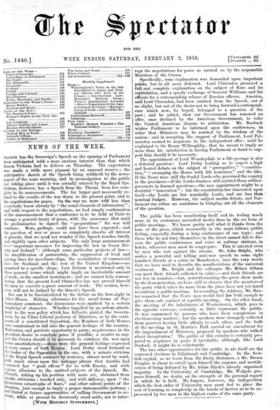NEWS OF THE WEEK.
SeLnom has the Sovereign's Speech on the opening of Parliament been anticipated with a more anxious interest than that which Queen Victoria hail to deliver on Thursday. The expectation was made a trifle more piquant by an unusual reserve ; the anticipative sketch of the §peoch being withheld by the news- papers of the same morning, and its promulgation to the public not taking place until it was actually uttered by the Royal lips. Seldom, however, has a Speech from the Throne been less com- plete in its announcements. The far larger part necessarily re- lated to the results of the war down to the present point, and to the negotiations for peace. On the war we were told less than everybody knew already by "the usual channels of information " ; and with respect to the negotiations, we had simply confirmation of the announcement that a conference is to be held at Paris to arrange a general treaty of peace, with the assurance that until the preliminaries be signed the " preparations " for war will continue. More, perhaps, could not have been expected ; and the question of war or peace so -completely absorbs all interest at present, that we need not wonder if the Speech touches briefly and slightly upon other subjects. The only large announcement is—" important measures for improving the law in Great Bri- tain and Ireland " : although some particular projects of law— the simplification of partnership, the suppression of local and passing dues for merchant-ships, the assimilation of commercial laws for Scotland and the rest of the United Kingdom—are promised in a specific shape, Law Reform is mentioned only in those general terms which might imply an incalculable amount of work, or the smallest instalment ; and we cannot help remem- bering that the present Lord Chancellor has not proved himself the man to execute a great amount of work. The session, how- ever, will not be judged by the Queen's Speech. Nor can it be forecalculated by the debate on the first night in either House. Making allowance for the usual forms of Par- liamentary comment, the discussions were marked by a certain simplicity of character. Whether impelled by an ardent attach- meat to the war policy which has hitherto guided the Govern- ment, by an Ultra-Liberal jealousy of Ministers, or by the senti- ments of a constituted Opposition, the Members of both Houses were constrained to fall into the general feelings of the country. Moderation and patriotic superiority to party, acquiescence in the Prevalent desire to conclude peace if possible, a resolve to sup- Port the Crown should it be necessary to continue the war upon terms unsatisfactory,--Owse were the general feelings expressed Ill every corner of both Howes. Lord Derby stood forward as the leader of the Opposition in the one, with a minute criticism of the Royal Speech sentence by sentence, almost word by word, with much stress upon the unhappy phrase that Austria had "erased her " good offices" for us with Russia, and with ,,joire allusions to the omitted subjects of the Speech. Mr. ihsraeli, taking up his position with more art, abstained from Specific criticisms ; touched only, and with delicacy, upon "the el.ysterious catastrophe of Kars," and other salient points of the situation, just enough to imply a proper statesmanlike jealousy ;
astl hinted at future opportunities of calling Government to ac- 64111t, While at present he decorously stood aside, not to inter- [WI= MONTHLY Surrucauratr.)
rapt the negotiations for peace as carried on by the responsible Ministers of the Crown.
Specifically, some explanation was demanded upon important points, but in all cases deferred. Lord Clarendon promised a full and complete explanation on the subject of Kars and its capitulation, and a speedy exchange of General Williams and his officers for a corresponding release of Russian officers. America, said Lord Clarendon, had been omitted from the Speech, out of no slight, but out of the desire not to bring forward a correspond- ence which now, he hoped, belonged to a question of the past ; and he added, that our Government has renewed an offer, once declined by the American Government, to refer the Central American dispute to arbitration. Mr. Roebuck wishes Parliament to be informed upon the conferences, in order that Ministers may be assisted by the wisdom of the nation : and in accepting the support of Parliament, Lord Pal- merston seemed to acquiesce in the independent offer ; until he explained to Sir Henry Willoughby, that he meant to imply no more than his satisfaction in having Parliament at hand to sup- port him should it be necessary. The appointment of Lord Wensleydale to a life-peerage is also a deferred question ; Lord Derby leading us to expect a high ' and heated debate on the subject of "prerogative," "constitu- tion," "swamping the House with life nominees," and the like. If the Peers were still the feudal Lords who governed the country in the provinces—if the Lords-Justices still assisted those soldier- governors in learned questions—the new appointment might be a doubtful " innovation" ; but the constitution his innovated upon itself—the Lords are but nominally Lords, and are leas than - nciminal Judges. However, the subject merits debate, and Par- liament can refuse no assistance in bringing out all the elements of the question.










































